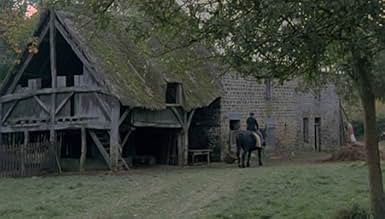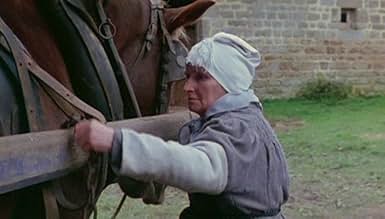As brutally shocking, displeasing and controversial as its title, this adaptation of Michel Foucault's report on a real homicide that
took place in 1835, in Normandy, France, is a pyschological analysis on the thin line between monomania and psychosis, murder with a purpose or simply madness as it
retells the tragedy of Rivière family, with three members of it being killed by 18-year-old Pierre Rivière. Foucault's detailed account, with a
gathering of several 19th century reports, news and legal transcripts, is a tough material to be absorbed except for the boy's written testimony
detailing his life and the reason for the murders; the film translates with a great sense of accuracy what was written by Pierre, and some of the
court testimonies, without approaching on the pyschiatric aspects of it all - those are destined for us in the audience to decide.
Newcomer Claude Hébert plays the title role with perfection, as there are detailed descriptions about his physicality and behavior, as an
outcast with serious mental problems, barely connecting with other people and living in his own inner world that was slowly affected by the care he had for his father, a farmer mistreated
by his own demanding wife in a loveless marriage where she tormented the life out of him. The boy moves to bizarre antics, hurting animals and once he
had a fixed idea that the mother and her sister (who was also against the dad) needed to be eliminated, after biblical and mythical reasonings,he
goes after the intent (the little brother was a case of wrong place, wrong time).
The view from afar benefits the film adaptation rather than having Pierre being the narrator of his own tragedy as it would alienate audiences
in not believing in the young man's intelligence (for someone who had little knowledge of words and expressions, he composed a fine piece to be read
and it's the most important parts of Foucault's gathering, an almost unashamed confession). And the challenge is destined for viewers to figure out
if he's acting out of madness, if there's a sole (valid?) purpose for the murders and how the legal system, doctors, lawyers and jurors saw the case
when it came the time for decide between capital punishment, life in prison or rehabilitate through a mental institution. It doesn't stay focused much
on that latter part (as it goes in the novel, which becomes a repetitive bore at the end), but it should as it'd give a fascinating view on how this
scenario, the French modification of laws related to patri-matricide at that time, and how society reacted to those horrific crimes.
And it's insanely bizarre how much the thinking audiences will be inclined to favor much of Pierre's actions, either reading his story or watching
the film. The mother is a devil incarnate with countless mood swings, completely erratic behavior and unstoppable, as there were always times when she
brought her husband to court and she always got favored over the poor man. Not that we defend the murderer and his barbarian act, but it's one of those
things that it's hard to defend a poor excuse of a wife and mother. Plus, his arguments of defense and protection of his father, through the use of
biblical and historical references is the kind of thing that could quiet any unwise prosecutor in charge of the accusation.
Interesting and believable performances, wiht a cast formed mostly by locals of the actual place of the homicide happened 100 years earlier. By
today's standards it's somewhat tame when it comes to its actual title and never exploitative as a Hollywood film would be, but it serves a higher
purpose in documenting a classic criminal case in France, how it was dealt, and the many inner questionings that revolved on people's minds about
Pierre's insanity or his monomania. It's all about sorrow and no one wins. 9/10.












